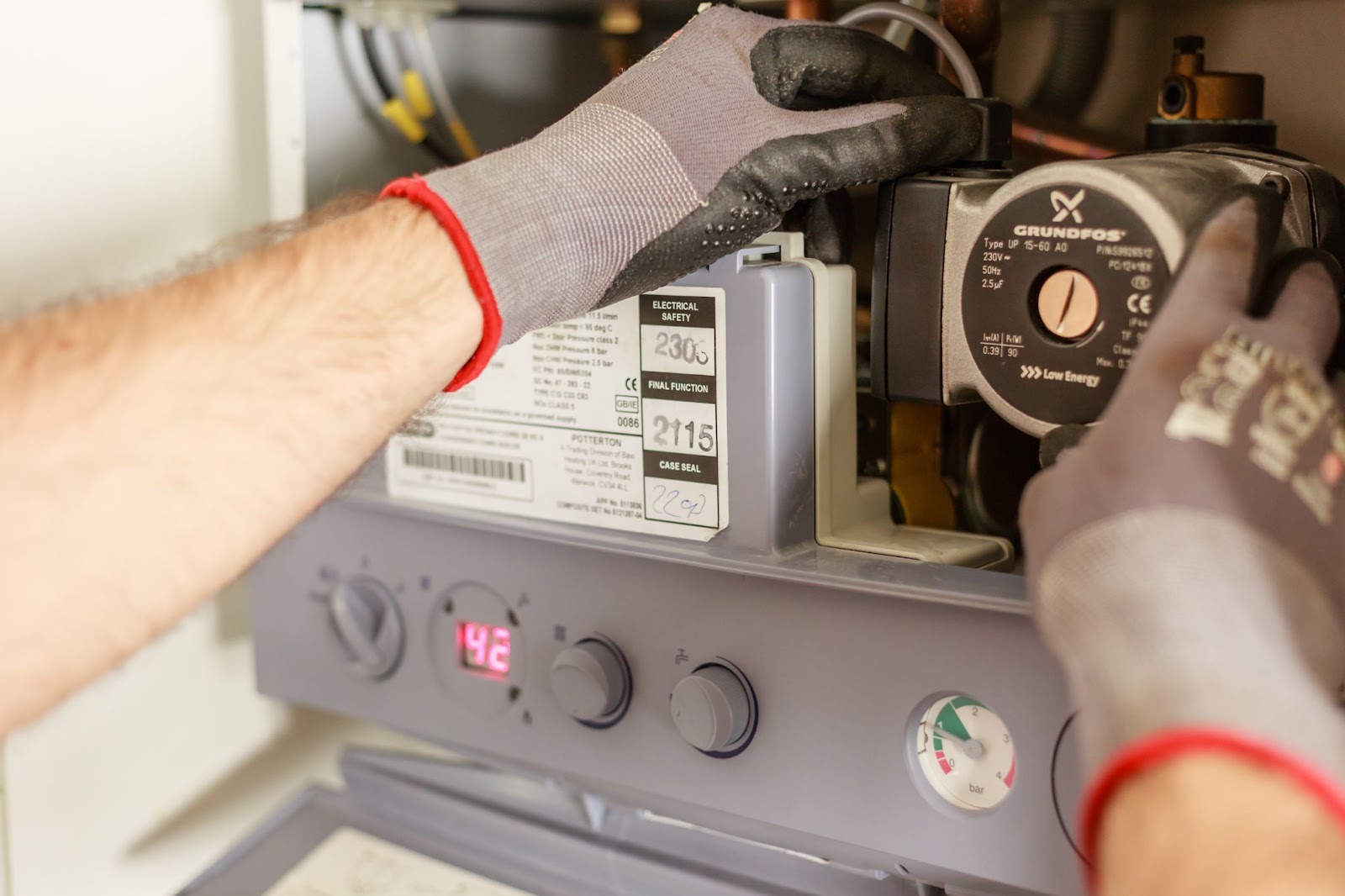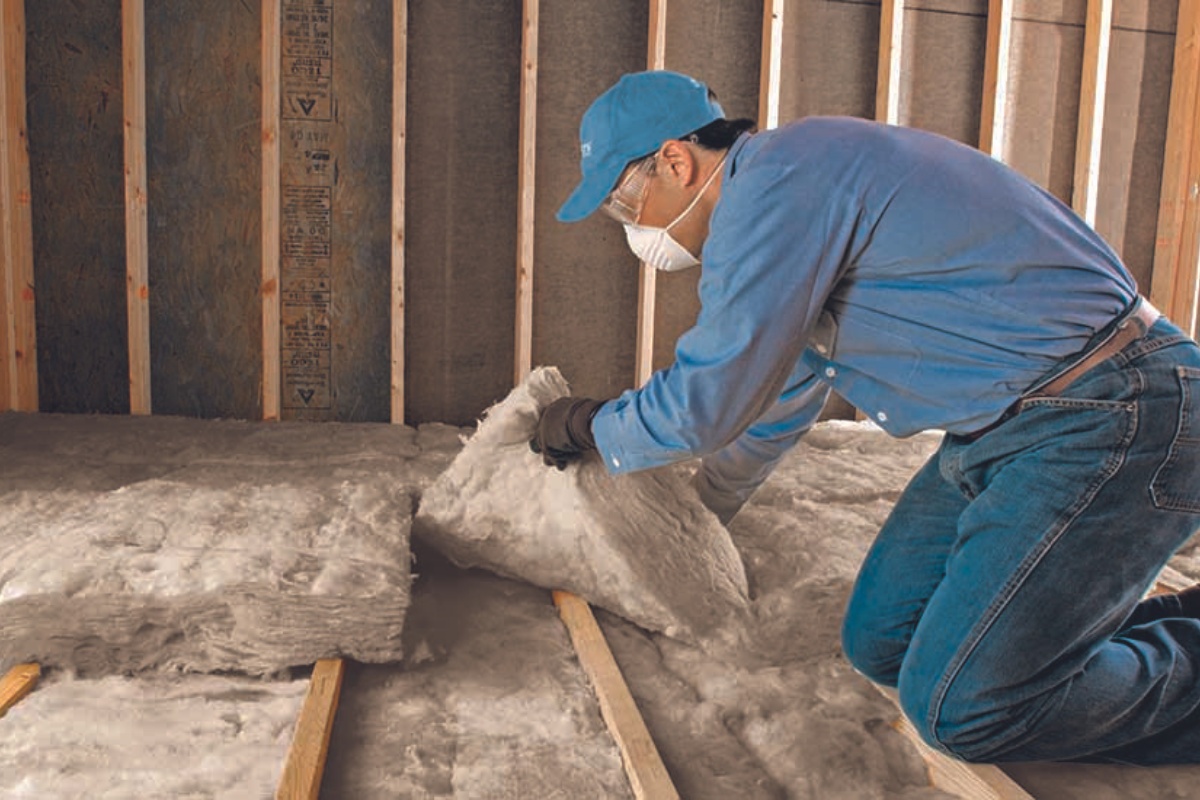

Articles
How To Grow A Plumbing Business
Modified: January 6, 2024
Looking for articles on how to grow a plumbing business? Discover valuable tips and strategies to expand your plumbing business and increase its success.
(Many of the links in this article redirect to a specific reviewed product. Your purchase of these products through affiliate links helps to generate commission for Storables.com, at no extra cost. Learn more)
Introduction
Starting and growing a plumbing business can be an exciting and rewarding endeavor. Whether you are a seasoned plumber looking to branch out on your own or an entrepreneur interested in entering the lucrative field of plumbing services, building a successful plumbing business requires careful planning, strategic marketing, excellent customer service, and efficient operations.
In this article, we will provide you with valuable insights and practical tips on how to grow a plumbing business and establish a strong foundation for sustainable growth and long-term success.
From establishing an effective marketing strategy to managing finances, hiring the right team, leveraging technology, and expanding into new markets, we will cover various aspects of growing a plumbing business and provide actionable steps to help you achieve your goals.
So, if you are ready to take your plumbing business to the next level and maximize its potential, let’s dive in!
Key Takeaways:
- Establishing a strong foundation, utilizing technology, and maintaining quality customer relationships are essential for the sustainable growth of a plumbing business.
- Implementing effective marketing strategies, expanding into new markets, and continuously innovating are key to positioning a plumbing business as a leader in the industry.
Read more: How To Grow Your Landscaping Business
Establishing a Strong Foundation for Your Plumbing Business
Building a strong foundation is crucial for the success of any business, and a plumbing business is no exception. Here are some key steps to help you establish a solid foundation:
- Define your business vision and goals: Clearly define your long-term vision for your plumbing business and set specific goals that align with that vision. This will provide you with a clear direction and purpose.
- Develop a comprehensive business plan: A well-crafted business plan will serve as your roadmap. It should include market research, competitor analysis, financial projections, and strategies for marketing and operations. A business plan is essential for securing financing and attracting potential investors.
- Register your business and obtain necessary licenses: Consult local authorities to understand the legal requirements and regulations for running a plumbing business in your area. Register your business with the appropriate authorities and obtain any necessary licenses and permits.
- Create a strong brand identity: Develop a compelling brand identity that reflects the values and professionalism of your plumbing business. This includes creating a memorable logo, defining your brand voice, and establishing consistent visual elements across your marketing materials.
- Build a professional website: In today’s digital age, having a professional website is essential for any business. Your website should showcase your services, provide contact information, and include testimonials from satisfied customers. It should also be mobile-friendly and optimized for search engines.
- Invest in professional branding materials: From business cards and flyers to vehicle decals and uniforms, invest in high-quality branding materials that help create a professional and reputable image for your plumbing business.
- Set up a reliable accounting system: Implement an efficient accounting system to track your expenses, income, and profitability. This will help you make informed financial decisions and ensure compliance with tax regulations.
By following these steps and investing time and effort into establishing a strong foundation, you will position your plumbing business for long-term growth and success.
Developing an Effective Marketing Strategy
Marketing plays a crucial role in growing your plumbing business and attracting new customers. Here are some key steps to help you develop an effective marketing strategy:
- Identify your target market: Understand who your ideal customers are. Consider factors such as demographics, location, income level, and specific plumbing needs. This will help you tailor your marketing efforts to reach the right audience.
- Create a strong online presence: In today’s digital age, having a strong online presence is essential. Build a professional website optimized for search engines, create social media accounts, and list your business on online directories. Regularly update your online profiles with relevant content and engage with your audience to build trust and credibility.
- Implement search engine optimization (SEO) techniques: Optimize your website with relevant keywords, meta tags, and descriptions to improve your search engine ranking. This will increase your visibility and attract organic traffic to your website.
- Utilize pay-per-click (PPC) advertising: Consider running targeted PPC campaigns using platforms like Google Ads. This allows you to display ads to users actively searching for plumbing services in your area. Set a budget, monitor campaign performance, and make adjustments to maximize your return on investment.
- Develop content marketing strategies: Create informative and engaging content related to plumbing tips, maintenance, and common problems. This can be in the form of blog posts, videos, or infographics. Share your content on your website, social media channels, and industry forums to position yourself as an authority in the plumbing industry.
- Build strong relationships with local businesses: Collaborate with local contractors, home builders, and property managers. Offer incentives for referrals and establish mutually beneficial partnerships. Networking with other professionals can help you expand your reach and attract new customers.
- Encourage customer reviews and testimonials: Positive reviews and testimonials from satisfied customers can greatly influence potential clients. Encourage your customers to leave reviews on platforms like Google My Business or Yelp. Display these reviews prominently on your website and marketing materials.
- Measure and analyze your marketing efforts: Regularly track and analyze the performance of your marketing campaigns. Use tools like Google Analytics to monitor website traffic, conversion rates, and customer behavior. Identify what strategies are working and make data-driven decisions to optimize your marketing efforts.
Remember, a well-executed marketing strategy can help you reach a wider audience, build brand awareness, and ultimately generate more leads for your plumbing business.
Building and Maintaining Positive Customer Relationships
Building and maintaining positive customer relationships is essential for the success and growth of your plumbing business. Satisfied customers are more likely to become repeat clients and refer your services to others. Here are some key strategies to help you establish and nurture strong relationships with your customers:
- Provide excellent customer service: Make customer satisfaction your top priority. Respond promptly to inquiries, provide clear and accurate information, and be attentive to your customers’ needs. Be courteous, professional, and respectful in all interactions.
- Communicate effectively: Establish open lines of communication with your customers. Use clear and concise language to explain plumbing issues, solutions, and costs. Keep your customers informed throughout the entire process, from scheduling appointments to completion of the job.
- Exceed expectations: Go above and beyond to exceed your customers’ expectations. Offer prompt service, arrive on time, and complete the job in a timely manner. Provide additional advice or tips to help customers prevent future plumbing issues.
- Personalize your interactions: Treat each customer as an individual. Address customers by their names, listen attentively to their concerns, and tailor your solutions to their specific needs. Building a personal connection and showing genuine care will help build trust and loyalty.
- Handle complaints effectively: No business is perfect, and occasional complaints may arise. Respond to complaints promptly, acknowledge the issue, and work towards a fair resolution. Turning a negative experience into a positive one can help strengthen your relationship with the customer.
- Offer loyalty programs or incentives: Reward loyal customers with special discounts, referral programs, or exclusive offers. This not only encourages repeat business but also motivates customers to refer your services to their friends and family.
- Seek feedback: Regularly ask your customers for feedback on their experience with your plumbing services. This can be done through surveys, follow-up calls, or email communication. Use this feedback to improve your services and address any areas of concern.
- Maintain regular contact: Stay in touch with your customers even after completing a job. Send personalized holiday greetings, regular newsletters with useful plumbing tips, or reminders of routine maintenance. This helps to maintain a long-term relationship with your customers.
Remember, building positive customer relationships is an ongoing process. By providing exceptional customer service and going the extra mile, you can create a loyal customer base that will not only support your plumbing business but also recommend your services to others.
Managing Finances and Budgeting for Growth
Managing your finances and implementing effective budgeting strategies are crucial for the long-term growth and success of your plumbing business. Here are some key steps to help you effectively manage your finances:
- Create a detailed financial plan: Develop a comprehensive financial plan that outlines your business expenses, revenue projections, and profit margins. Consider factors such as overhead costs, equipment maintenance, insurance, and marketing expenses.
- Track your income and expenses: Implement an efficient system to track and monitor your income and expenses. Keep accurate records of all transactions, including receipts and invoices. This will help you make informed financial decisions and identify areas where you can reduce costs.
- Set a budget: Create a realistic budget that covers all your expenses and allows for business growth. Allocate resources to different areas of your business, such as marketing, equipment upgrades, and employee training. Regularly review and adjust your budget as needed.
- Minimize unnecessary expenses: Analyze your expenses and identify areas where you can cut costs without compromising the quality of your service. Look for savings opportunities, negotiate better deals with suppliers, and consider leasing equipment instead of purchasing outright.
- Manage cash flow effectively: Cash flow is vital for the smooth operation of your plumbing business. Implement strategies to ensure that you have enough cash on hand to cover your expenses, such as offering discounts for early payments, invoicing promptly, and following up on unpaid invoices.
- Invest in technology: Leverage technology to streamline your financial processes and reduce manual errors. Utilize accounting software to automate tasks such as invoicing, payroll, and financial reporting. This will save you time and improve accuracy.
- Secure funding if needed: If you require additional funding to support the growth of your plumbing business, explore options such as small business loans, grants, or partnerships with investors. Ensure that you have a solid business plan and financial projections to present to potential lenders or investors.
- Seek professional advice: Consider consulting with a financial advisor or accountant who specializes in small businesses. They can provide valuable insights and guidance, help you optimize your financial strategies, and ensure compliance with tax regulations.
By effectively managing your finances, budgeting wisely, and making informed financial decisions, you can lay a strong foundation for the growth and success of your plumbing business.
Read more: How To Market My Plumbing Business
Hiring and Training a Skilled Team
Building a skilled and reliable team is essential for the growth and success of your plumbing business. Here are some key steps to help you hire and train a skilled team:
- Determine your hiring needs: Assess your current workload and identify the specific roles and skills you need to grow your plumbing business. This could include positions such as plumbers, apprentices, office staff, or marketing personnel.
- Recruit proactively: Seek candidates actively by utilizing multiple channels such as online job boards, social media platforms, referrals from industry contacts, and attending trade shows or networking events. Develop a clear job description and screening process to help streamline the recruitment process.
- Conduct thorough interviews: Screen candidates based on their qualifications, experience, and cultural fit with your business. Ask relevant questions to assess their technical skills, problem-solving abilities, and customer service orientation. Consider conducting practical assessments or reference checks to further evaluate their capabilities.
- Invest in ongoing training: Plumbing technology, techniques, and regulations are constantly evolving. Provide ongoing training and professional development opportunities for your team to keep their skills up to date. This can include attending industry conferences, workshops, or online training courses.
- Create a positive work culture: Foster a positive and supportive work environment. Encourage teamwork, open communication, and mutual respect among your team members. Recognize and reward their achievements to boost morale and foster loyalty.
- Develop clear policies and procedures: Establish clear policies and procedures for your team to ensure consistency and operational efficiency. Communicate expectations regarding work quality, safety protocols, customer service standards, and ethical practices.
- Provide the necessary tools and equipment: Supply your team with the right tools and equipment to perform their jobs effectively and safely. Regularly maintain and upgrade equipment to ensure optimal performance.
- Encourage teamwork and collaboration: Foster a collaborative work environment where team members can share their knowledge and expertise. Encourage mentoring and cross-training to develop a versatile and well-rounded team.
- Offer competitive compensation and benefits: Provide competitive salaries and benefits packages to attract and retain skilled talent. Regularly review and adjust compensation based on market trends and performance evaluations.
- Continuously evaluate and provide feedback: Regularly evaluate the performance of your team members and provide constructive feedback. Set goals and provide opportunities for growth and advancement within the company.
By adopting these strategies, you can hire and train a skilled team that will contribute to the growth and success of your plumbing business. A dedicated and well-trained team will provide excellent service to your customers, and ultimately contribute to the reputation and profitability of your business.
Utilizing Technology and Software for Efficient Operations
In today’s digital age, utilizing technology and software solutions is crucial for the efficient operation of your plumbing business. Not only can technology streamline processes and increase productivity, but it can also enhance customer service and improve overall business performance. Here are some key ways to leverage technology:
- Implement field service management software: Field service management software can help streamline your operations by managing scheduling, dispatching, and tracking job progress. It also allows for real-time communication between your office and field staff, ensuring efficient coordination and timely service.
- Utilize customer relationship management (CRM) software: CRM software helps you manage customer interactions, maintain accurate customer records, and track communication history. It allows you to personalize your interactions, manage follow-ups, and analyze customer data to better understand their needs.
- Adopt digital invoicing and payment systems: Digitizing your invoicing and payment processes can significantly speed up payment collection and reduce administrative tasks. Online payment systems allow customers to pay invoices conveniently and securely, improving cash flow and reducing the risk of late payments.
- Embrace mobile technology: Equip your field staff with mobile devices, such as tablets or smartphones, loaded with necessary apps and software. This enables them to access job details, capture photos, generate reports, and communicate with the office or customers on the go.
- Automate inventory management: Use inventory management software to track and manage your plumbing supplies and equipment. It helps you maintain optimal stock levels, generate purchase orders, and track usage, reducing wastage and streamlining the procurement process.
- Enhance communication channels: Utilize various digital communication channels to connect with your staff, customers, and suppliers. This includes email, instant messaging platforms, video conferencing, and social media. Effective communication improves collaboration, customer service, and overall efficiency.
- Explore remote monitoring and diagnostics: Remote monitoring technology enables you to remotely monitor plumbing systems and equipment for potential issues or malfunctions. This allows for proactive service and reduces the need for physical inspections, saving time and resources.
- Implement accounting and bookkeeping software: Use accounting software to streamline financial tasks, such as tracking expenses, generating financial reports, and managing payroll. This simplifies bookkeeping, ensures accuracy, and provides valuable insights into your business’s financial health.
- Secure your data and information: Prioritize cybersecurity measures to safeguard sensitive customer data, financial information, and internal systems. Invest in data backup solutions, encryption tools, and educate your team on best practices for online security.
- Stay updated with industry trends: Continuously research and explore new technologies and software relevant to the plumbing industry. Stay informed about emerging trends, smart home technology, and advancements in efficient plumbing systems. This positions your business as innovative and keeps you ahead of the competition.
By effectively utilizing technology and software solutions, you can streamline operations, increase productivity, and enhance the overall efficiency of your plumbing business. Embracing digital tools empowers you to deliver better service to your customers, manage your resources effectively, and position your business for long-term growth and success.
Focus on providing excellent customer service to build a strong reputation. Satisfied customers are more likely to recommend your business to others, leading to growth.
Expanding Your Plumbing Business into New Markets
Expanding your plumbing business into new markets can open up exciting growth opportunities and increase your customer base. Here are some key steps to help you successfully expand your plumbing business:
- Market research and analysis: Conduct thorough market research to identify potential new markets. Consider factors such as population demographics, competition, demand for plumbing services, and regulatory requirements. Analyze the feasibility and potential profitability of expanding into these markets.
- Develop a strategic growth plan: Create a comprehensive plan that outlines your goals, target markets, marketing strategies, resource allocation, and financial projections. This plan will serve as your roadmap for expanding into new markets and guide your decision-making process.
- Target specific customer segments: Direct your marketing efforts towards specific customer segments within the new market. Identify the unique needs and preferences of these segments, and tailor your messaging and services to meet those needs.
- Network and build industry partnerships: Forge relationships with local contractors, real estate agents, property managers, and other professionals in the new market. Collaborate on projects, offer referrals, and participate in industry events to expand your network and gain visibility.
- Adapt your marketing strategies: Customize your marketing strategies to suit the new market. Consider local advertising channels, social media platforms, and online directories that are popular among the target audience. Adjust your messaging and branding to resonate with the local market.
- Obtain necessary licenses and certifications: Research and understand the licensing and certification requirements in the new market. Ensure that your business is compliant with local laws and regulations. Obtain any necessary permits, licenses, or certifications to operate legally in the new market.
- Monitor competitive landscape: Keep a close eye on your competitors in the new market. Study their strategies, pricing, services, and customer reviews. Identify ways to differentiate your plumbing business and provide unique value to customers.
- Hire and train local talent: Consider hiring local staff who are familiar with the new market. They will have a better understanding of local preferences, cultural nuances, and customer expectations. Provide training to ensure consistency in service quality and adherence to your business standards.
- Deliver exceptional customer service: Maintain your reputation for excellent customer service in the new market. Focus on building strong relationships with your new customers and exceeding their expectations. Word-of-mouth recommendations will play a vital role in your success in the new market.
- Evaluate and adjust: Continuously monitor and evaluate the performance of your business in the new market. Analyze sales data, customer feedback, and market trends. Use this information to make informed decisions, adjust your strategies, and capitalize on emerging opportunities.
Expanding into new markets can bring fresh opportunities for your plumbing business. By carefully planning, adapting your strategies, and providing exceptional service, you can successfully establish a presence in new markets and drive the growth of your business.
Building a Reputable Brand Image
Building a reputable brand image is essential for establishing trust, attracting customers, and differentiating your plumbing business from competitors. Here are some key steps to help you build a strong and reputable brand image:
- Define your brand identity: Clearly define your brand values, mission, and unique selling propositions. Determine what sets your plumbing business apart from others in the industry.
- Create a memorable logo and visual identity: Design a professional and visually appealing logo that represents your plumbing business. Develop a consistent visual identity through the use of colors, fonts, and graphic elements. Apply this branding consistently across all marketing materials and touchpoints.
- Develop a compelling brand story: Craft a story that communicates the passion, expertise, and values that drive your plumbing business. Connect emotionally with your audience by sharing your journey, successes, and commitment to exceptional service.
- Consistently deliver excellent service: Your brand image is reinforced through the quality of your work and customer service. Strive for excellence in every interaction, delivering consistent service that exceeds customer expectations.
- Build a strong online presence: Establish a professional website that showcases your services, expertise, and customer testimonials. Create and regularly update social media profiles that engage your target audience. Monitor online reviews and respond to customer feedback promptly and professionally.
- Emphasize transparency and honesty: Build trust with your customers by being transparent and honest in your communication. Provide clear explanations of the work that needs to be done, the associated costs, and any potential risks or limitations.
- Invest in customer relationships: Value your existing customers and nurture long-term relationships. Engage with them through personalized communication, follow-up calls, and loyalty programs. Encourage customer referrals and leverage positive testimonials to strengthen your brand reputation.
- Engage in community involvement: Participate in community events, sponsor local organizations, and support charitable initiatives. Demonstrating your commitment to the community enhances your brand image and fosters goodwill.
- Monitor and manage your online reputation: Regularly monitor online platforms for customer reviews and feedback. Respond promptly and professionally to both positive and negative comments. Address any issues to show your commitment to customer satisfaction and continuous improvement.
- Differentiate through specialized services or expertise: Identify areas of specialization, such as eco-friendly plumbing solutions, energy-efficient options, or innovative technologies. Highlight these unique services to position your brand as an industry leader.
- Consistently deliver on promises: Reliability and consistency in service delivery are key to building a reputable brand image. Always deliver on your promises, whether it’s meeting deadlines, providing accurate estimates, or resolving customer issues promptly.
Building a reputable brand image takes time and effort, but the benefits are worth it. By consistently delivering excellent service, engaging with your customers, and differentiating your plumbing business, you can build a strong brand that attracts loyal customers and sets you apart in the industry.
Read more: How To Grow My Lawn Care Business
Implementing Effective Sales Techniques
Implementing effective sales techniques is crucial for growing your plumbing business and converting leads into paying customers. Here are some key strategies to help you improve your sales process:
- Build strong relationships: Focus on building trust and establishing strong relationships with your potential customers. Take the time to understand their needs and concerns, and offer personalized solutions.
- Effective communication: Clearly communicate your services, pricing, and any additional value you can provide. Use simple, jargon-free language to explain complex plumbing concepts and options. Listen actively to your customers and address their questions or concerns effectively.
- Demonstrate expertise: Showcase your plumbing expertise and industry knowledge when interacting with potential customers. Provide helpful advice and recommendations based on your experience. This establishes you as a trusted authority in the plumbing industry.
- Create urgency: Highlight the importance of addressing plumbing issues promptly. Explain potential consequences of delaying repairs or maintenance. By creating a sense of urgency, you can motivate potential customers to take action quickly.
- Upselling and cross-selling: Look for opportunities to upsell or cross-sell additional services or products. For example, if a customer needs a water heater replacement, you can suggest additional energy-efficient options or water filtration systems.
- Provide transparent pricing: Be honest and transparent about your pricing structure. Clearly explain the costs involved and any potential additional charges. Offering detailed and transparent quotes builds trust with customers.
- Offer financing options: Some plumbing services may involve significant costs. By offering financing options or payment plans, you can make your services more accessible to a wider range of customers. Partner with financing institutions or explore in-house financing options.
- Use customer testimonials: Highlight positive customer testimonials and reviews to reinforce the quality of your services. Displaying feedback from satisfied customers can help build trust and credibility with potential clients.
- Follow up: Regularly follow up with potential customers who have shown interest in your services. Send personalized emails or make phone calls to check if they have any further questions or if they are ready to move forward with the project.
- Continuously improve your sales techniques: Evaluate your sales process regularly and identify areas for improvement. Seek feedback from your team and customers to understand their experiences. Invest in sales training for yourself and your team to refine your techniques.
By implementing these effective sales techniques, you can increase your conversion rates and drive growth for your plumbing business. Building relationships, effective communication, and showcasing your expertise will help you establish your brand as a trusted and reliable choice in the plumbing industry.
Maintaining Quality Control and Customer Satisfaction
Maintaining high-quality services and ensuring customer satisfaction are essential for the long-term success and growth of your plumbing business. Here are some key strategies to help you maintain quality control and keep your customers satisfied:
- Set high standards: Establish clear and high-quality standards for your plumbing services. Train your team on these standards and ensure they are consistently met in every job.
- Quality materials and equipment: Use reliable and high-quality materials and equipment for your plumbing projects. Investing in durable products ensures long-lasting solutions for your customers.
- Thorough inspections and testing: Conduct thorough inspections and tests to ensure that plumbing systems are functioning properly. This includes checking for leaks, pressure testing, and ensuring proper drainage.
- Continuous training and professional development: Provide ongoing training to your team to keep them updated with the latest plumbing techniques, technology, and safety protocols. Encourage certifications and participation in industry seminars and workshops.
- Quality assurance checks: Implement quality assurance procedures to review completed jobs. This can involve follow-up visits or surveys to ensure customer satisfaction and identify any areas for improvement.
- Effective project management: Have a structured project management process in place to ensure smooth coordination and communication between your team and the customer. Set realistic deadlines, manage expectations, and provide regular updates throughout the project.
- Responsive customer support: Make it easy for customers to reach you and address any concerns or questions they may have. Respond promptly to inquiries, be available for emergency calls, and provide clear and helpful communication.
- Investigate and address customer complaints: Take customer complaints seriously and address them promptly and professionally. Listen to the customer, investigate the issue thoroughly, and provide a fair and satisfactory resolution. Use complaints as learning opportunities to improve your processes.
- Monitor customer feedback: Regularly collect feedback from your customers through surveys, online reviews, or follow-up calls. Analyze this feedback to identify trends, areas for improvement, and areas where you excel.
- Continuous improvement: Strive for continuous improvement in all aspects of your business. Regularly review your processes and seek ways to enhance efficiency, quality, and customer satisfaction. Encourage feedback and ideas from your team to foster a culture of continuous improvement.
By maintaining quality control and keeping customer satisfaction at the forefront, you can establish a strong reputation for your plumbing business. Consistently delivering high-quality work, providing excellent customer service, and continually improving will contribute to customer loyalty, positive referrals, and the long-term success of your business.
Strategies for Scaling and Growing Your Plumbing Business
Scaling and growing your plumbing business is an exciting but challenging endeavor. To successfully expand your operations and increase your market share, consider implementing these key strategies:
- Develop a growth plan: Create a comprehensive growth plan that clearly outlines your business goals, target markets, expansion strategies, and resource allocation. This plan will serve as a roadmap for your growth initiatives.
- Expand your service offerings: Consider expanding your range of services to meet the evolving needs of customers. This can include offering specialized services like eco-friendly plumbing solutions, smart home technology integration, or energy-efficient options.
- Target new markets: Identify new geographical markets or customer segments that present growth opportunities. Conduct market research to understand the demand, competition, and regulatory landscape in these new markets. Tailor your marketing and sales efforts to target these specific markets.
- Strategic partnerships and acquisitions: Look for opportunities to partner with complementary businesses or consider acquisitions to expand your capabilities or access new markets. Collaborating with reputable contractors, home builders, or property managers can help you gain access to new customers and projects.
- Invest in marketing and branding: Allocate resources towards effective marketing strategies to increase your brand visibility and attract new customers. This can include digital marketing, targeted advertising, content marketing, and building a strong online presence.
- Optimize your operations: Streamline your operations to improve efficiency and productivity. Implement field service management software to manage scheduling, dispatching, and tracking job progress. Automate administrative tasks and invest in technology to optimize workflows and reduce manual errors.
- Build a strong team: As your business grows, hiring and retaining skilled professionals become crucial. Continuously invest in recruiting, training, and retaining top talent. Foster a positive work culture, provide opportunities for advancement, and reward high performance.
- Develop strategic alliances: Collaborate with suppliers, manufacturers, or industry associations to establish strategic alliances. These partnerships can provide access to discounted pricing, specialized products, or exclusive opportunities that can contribute to your business growth.
- Enhance customer experience: Focus on delivering exceptional customer service to build loyalty and positive referrals. Continually assess and improve your customer service processes, implement feedback mechanisms, and personalize your interactions to exceed customer expectations.
- Stay ahead of industry trends: Keep abreast of emerging trends, technologies, and industry regulations. Stay updated with new plumbing techniques, energy-efficient solutions, environmental standards, and smart home technology optimization. This will position your business as forward-thinking and attract customers who value innovation.
Scaling and growing your plumbing business requires careful planning, strategic execution, and continuous improvement. By implementing these strategies, you can position your business for sustainable growth, expand your customer base, and stay competitive in the ever-evolving plumbing industry.
Conclusion
Growing a plumbing business requires a combination of strategic planning, exceptional service, and a strong commitment to customer satisfaction. By following the strategies outlined in this article, you can establish a solid foundation, expand your reach, and position your business for long-term success.
Starting with a strong foundation, define your vision, develop a comprehensive business plan, and create a reputable brand image. Utilize technology and software to streamline operations, enhance communication, and improve efficiency. Implement effective marketing strategies to reach your target market and attract new customers.
To ensure sustainable growth, prioritize maintaining high-quality services, nurturing positive customer relationships, and continuously improving your sales techniques. Expand into new markets, develop strategic partnerships, and explore opportunities for scaling your business. By staying ahead of industry trends and continuously innovating, you can position your plumbing business as a leader in your field.
Remember to monitor and analyze your performance, seek customer feedback, and make data-driven decisions. Adapt and adjust your strategies as needed to meet the evolving needs and preferences of your target market.
Ultimately, growing a plumbing business takes dedication, hard work, and a commitment to delivering exceptional service. By providing expert plumbing solutions, building strong relationships, and continuously striving for excellence, you can achieve sustainable growth, increase your market share, and establish a reputation as a trusted and reliable plumbing business.
So, embark on your journey, apply these strategies, and watch your plumbing business thrive.
Frequently Asked Questions about How To Grow A Plumbing Business
Was this page helpful?
At Storables.com, we guarantee accurate and reliable information. Our content, validated by Expert Board Contributors, is crafted following stringent Editorial Policies. We're committed to providing you with well-researched, expert-backed insights for all your informational needs.














0 thoughts on “How To Grow A Plumbing Business”